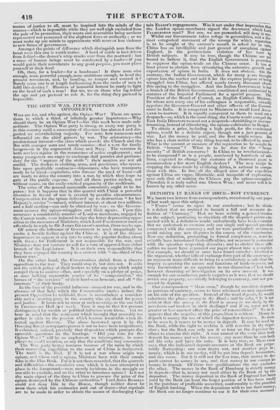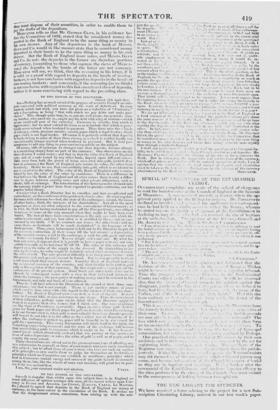DEPOSITS IN BANKS OF ISSUE—NOT CURRENCY. Ws insert two letters
from correspondents, occasioned by onr paper of last week upon this subject.
" UNITY " seems to agree in our conclusion ; but he thinks it a defect that we omitted to furnish a full and accurate de- finition of " Currency." Had we been writing a general treatise on the subject, prothssing to elucidate all the disputed points con- nected with it, a definition would undoubtedly have been essential. But we undertook to examine only one single and special question connected with the curreney ; and we were particularly anxious to avoid raising any new disputes in the course of the examination. Now any definition, preteeding to lbrmal completene..s, must in- evitably have introduced -fresh difficulties, not necessarily connected with the question respecting deposits ; and to &avian.. thrse diffi- culties we must have expanded our paper almost into a pamphlet. For example, we should at once have fbund ourselve, imolved itt the argutnent, whether bills of exchange form part of the cuirdney,— an argument more difficult to bring to a satisfactory result than the inquiry respecting the nature and functions of bank-dcposas, and very inconvenient as an appendix to our discussion cf last week, however deserving of hivestigation on Its own account. It was enough for our conclusion, purely negative as it was, that we should notice one property, essentially belonging to currency, and not pos- sessed by deposits. Our correspondent " MERCATOR," though he considers deposits as portions of currency, seems to have advanced no new arguments on his side of the question. Instead of the word this:sits, he would substitute the phrase money in the .Bank ; and he asks, " Is it not evident that the mow/ ia the Bank is money in ass (lady, by the merchants and boaters it) their dealings ? and if so, must uot its greater or less amount affect the price of commodities ?'"fo us it appears that the negative of this proposition is evident. Money in deposit is money the use of which the depositor foregoes. So soon as he uses it, it ceases to be money in deposit. it may be used by the Bank, while the right to reclaim it still remains in the depo- sitor ; but the Bank ean only use it so long as the depositor de-
clines to exercise this right. A man cannot at the same time both deposit his money and use his money, any more than he can both cat his cake anti have his cake. It is very true, as 11.1.nacAT0a says, that the individual deposit-accounts at the Bank are perpe- tually fluctuating: one man draws out, and another pays in;
money, which is in use to-day, will be put into deposit to-morrow, and vice versa. But it is still not the less true, that money in de- posit cannot be money in use, nod that money in use cannot be
monev in deposit. Of these two qualifications the one excludes the other. The money in the Bank of Hamburg is strictly money in deposit—that is, money not used either by the Bank or by the depositor. The money deposited in time Bank of England has been used by the Bank (at least the larger portion of it has beep used) in the purchase of' profitable securities, conformably to the practice of English banking. When the depositors wish to use their money, the Bank can no longer continue to use it for their own account ; dispose of their securities, in order to enable them to I Iva thetjtt'
t Y Day the drafts of the depositors. Idnacieron tells us that Mr. GEORGE GLYN, in his evidence be- fore the Committee of 18,32, stated that he considered money de- posited in the Bank of England to be the same thing as money in his own drawer. .Any of the depositors io the bank of Messrs. GisN and CO. would in like manner state that he considered money deposited in their hands to be the same thing as money in his own drawer. But the Bank of England issue notes, and ;Nlessrs.GLys d Co do not the deposits in the former are theretbre portions of currency, (according to those who espouse the views of Mr:tic:A- .1.0a) the deposits in the. hands or the latter are not currency. Alese,yrom will see, N.Ve thIllk, that the reasoning in his letter, if it is Valid as a proof with regard to deposits in the hands of ismliw.g- bankers, is not less conclusive with regard to deposits in the hand., of nOn-issuing hankers : and conversely, if the reasoning (as we think) is not conclusive with regard to this last-mentioned class of deposits, neither is it more convincing with regard to the preceding class.



























 Previous page
Previous page